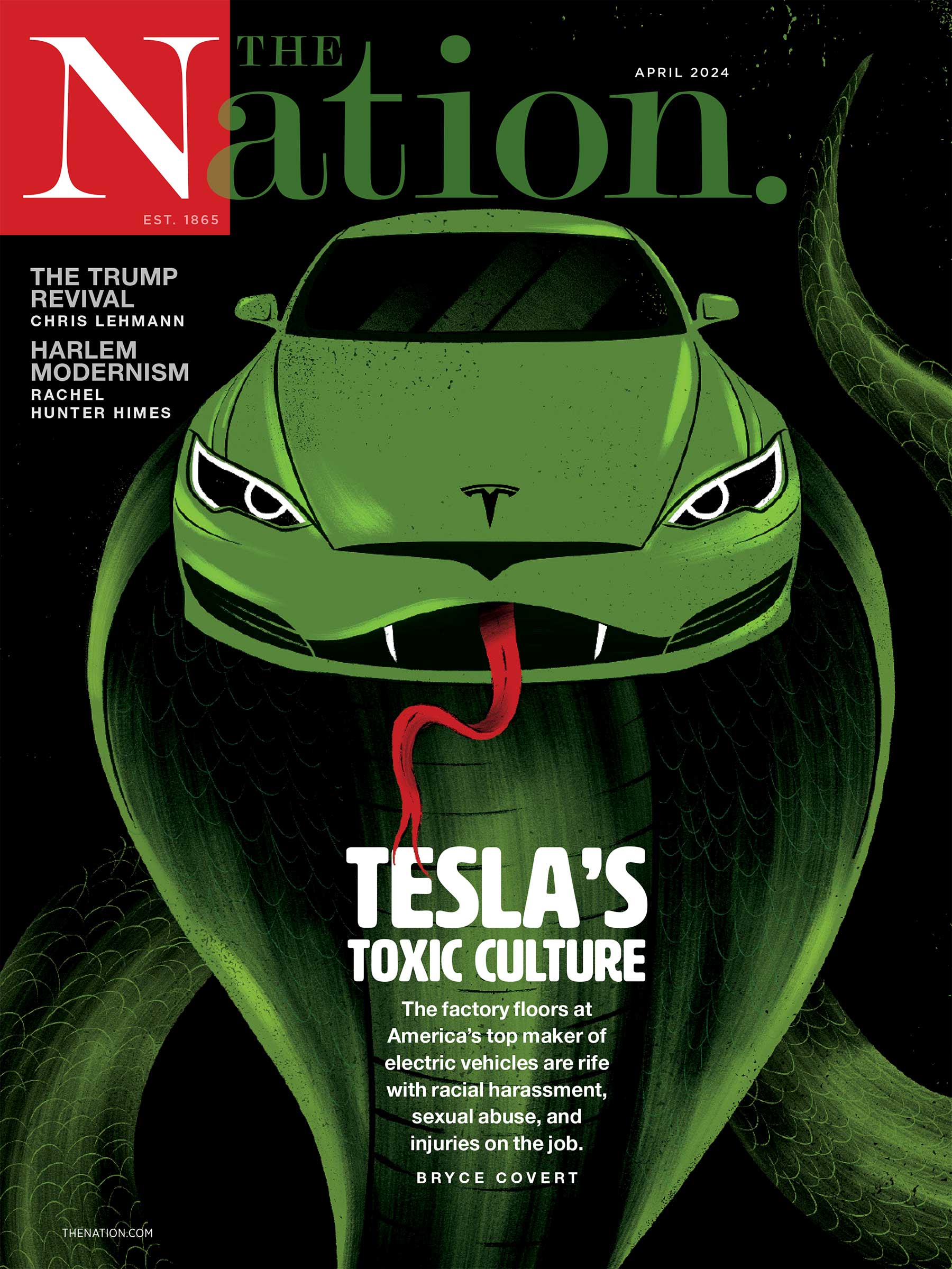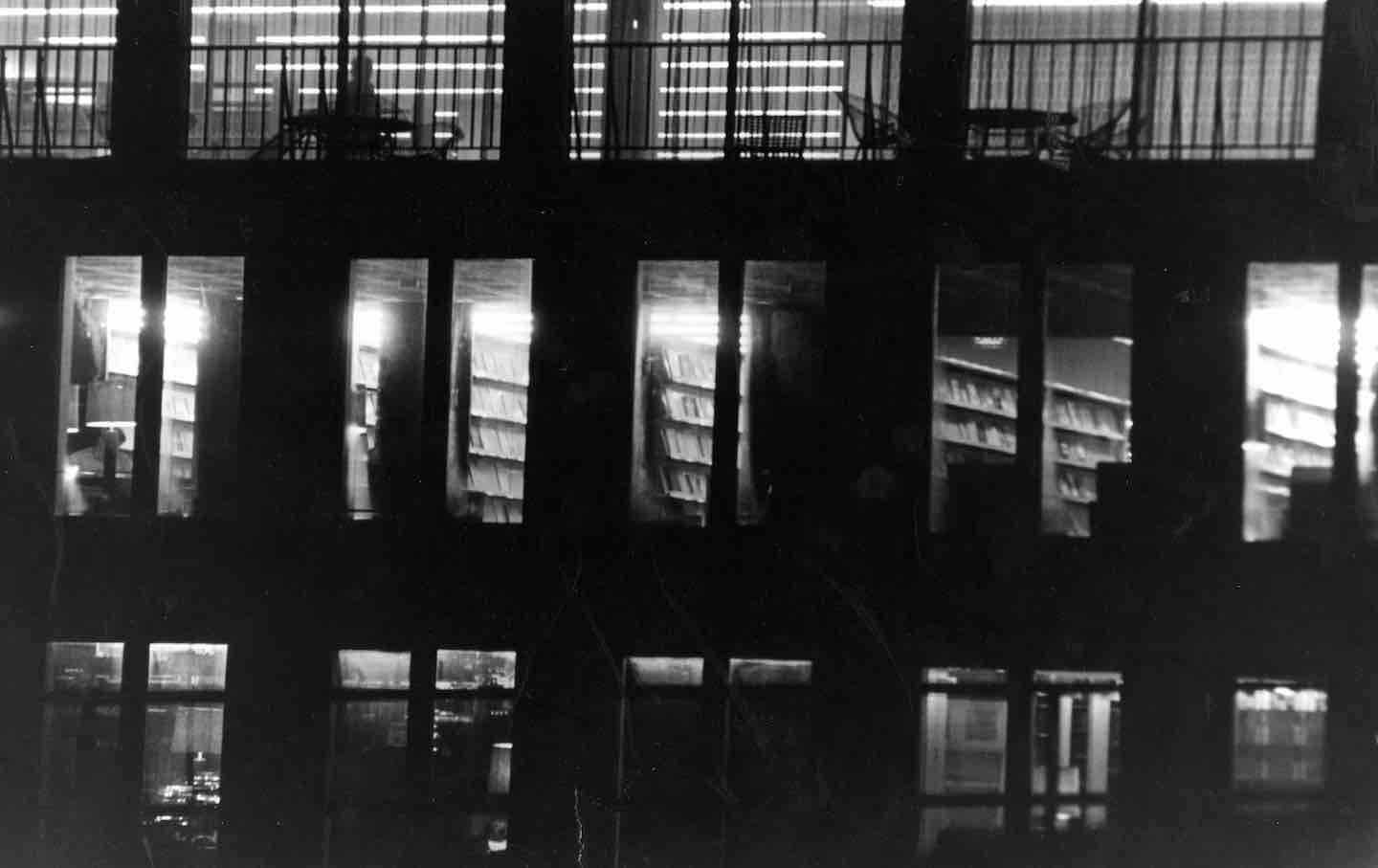The Nation speaks to Jessi Jezewska Stevens about her new short-story collection, which dramatizes late-capitalist living.
Jessi Jezewska Stevens’s fiction wryly examines the vagaries of living in an age of downward mobility and phone-based anomie—with its indignities, its mystifications, its curious bursts of levity. Her 2020 novel, The Exhibition of Persephone Q, is a sort of post-9/11 ghost story, while The Visitors (2022) invites an actual gnome to Manhattan in the aftermath of the global economic crisis. Her first short-story collection, Ghost Pains, was published in March by And Other Stories. The characters in these stories miss cues and suffer their own maladroitness: In “The Party,” an American expat in Berlin is stuck hosting an agonizing party after confusing “reply” and “reply all.” Throughout the collection, there’s dread and there’s malaise, but I’d argue there really isn’t any cynicism—which is a feat for any observer of our era of speculation and paranoia. In place of cynicism is unexpected grace, like the ruminating newlywed protagonist of “Honeymoon” finds despite herself.
Now based in Geneva, after years of swearing she’d never leave New York City, she spoke to The Nation about the expat condition, how tech has changed fiction, and whether we can wrest back control of our lives. This interview has been edited for length and clarity.
—Rose D’Amora
Rose D’Amora: Can you speak a little about how you were engaging with the history of the expat in literature?
Jessi Jezewska Stevens: I’m a huge Christopher Isherwood fan, and probably a completist in the Isherwood canon. But my favorite Henry James novel is Portrait of a Lady, both as his great study of consciousness and interiority but also as an American-abroad story. And I think that James is especially famous in this vein of American expat self-discovery: Part of that is simply discovering how American one is. Portrait of a Lady dramatizes the insecurity of the American, the American sense of a cultural inferiority in looking to Europe. And I think that sense of nervousness about being “found out” is a source of a lot of the humor in the stories. Something I was also interested in, which maybe speaks to my own experience of being an expat, is dramatizing different relationships to history between Europeans and Americans.
I was born in the ’90s. I’m a very solid millennial, from that era when major ideological debates had been “solved.” Speaking of these past five tumultuous years, it seems like that ideological clarity is sort of over. And there’s a kind of American tendency toward ahistoricism: We can always improve; we can always reinvent. That’s sort of a double-edged sword. On the one hand, it’s an engine for progress and on the other it’s—
Current Issue

RD: Delusional?
JS: Yeah, it has its blind spots. I think that a few of the characters in my collection are sort of waking up to that idea of, “Oh what would it mean to be on the right side of history as an active project rather than an assumption?” and “Maybe it’s not as simple as I thought.”
RD: Insecurity is a defining emotional register in your collection—people who are insecure in the domestic sphere, about their relationships and their families. How do you see insecurity fitting into more intimate, and political, relationships in these stories?
JS: We’ve talked about some of the broader themes with relationships to history and insecurity with one’s place in history. I think I was just as interested in funneling that through individual relationships and the way that intimacy is aided or corrupted or complicated when we bring awareness of those issues to bear on it. And the characters are very American in their relationship to meritocracy: “I can achieve these things, here is the rubric, I have followed it.” I think there’s an instability there to that ambition, which is also a source of humor in the stories.
RD: You’re trained in mathematics. There’s a lot of quantification and valuation in these stories, like the financier in “Ghost Pains” who manipulates the demand for pork bellies. We live in a time that’s very quantification- and data-obsessed. Could you speak to the role the countable and uncountable plays here?
JS: A lot of that stands in for a sense of control—or rather lack thereof—in the face of economic systems, or just feeling that many of the habits that govern daily life are these sort of self-perpetuating machines. The idea that I don’t really need to participate, the market sort of clicks on without me, like foreign exchange rates. I think that’s why I have this fascination with trash, because it’s one of those few things that has exited the system of valuation. We could say, OK it’s waste. Or we could say, I feel kind of interested and fascinated by it, because if it’s exhausted of value, then maybe I can actually do something with this. There’s almost this potential simply because everything else is so value-laden. In The Exhibition of Persephone Q there’s a character who’s collecting trash with a metal detector. In my last novel, The Visitors, there’s a lot of consideration of waste and trash in this craft store the main character owns.
Popular
“swipe left below to view more authors”Swipe →
RD: The politics of restitution and the reclamation of asset claims comes up in “Ghost Pains,” where you discuss this tangled effort among both Polish Jews and Gentiles to secure compensation for homes and belongings seized in World War II. An American is trying to sort his family’s claim, i.e., confront a distinctly European problem. Could you elaborate on the restitution plot in the title story, and what you wanted it to accomplish?
JS: That is a really good example to bring up in terms of the pure inadequacy of valuation. I mean that it’s important and legitimate to pursue claims, but that the process also highlights the inadequacy of systems that try to quantify the unquantifiable, though they may be the only available recourse we have. In the story you mention there are these two old flames who meet by chance in Krakow, and one is seeking restitution for the apartment of his grandfather, who was a Holocaust survivor. And there are certain historical crimes, certain historical events that can just never be reconciled. And there are losses that can never be valued. And Poland is especially famous in European systems of restitution law for…
RD: For not having one!
JS: Right. And there have been decades of debate, and the more I looked into it, the more tangled it became. While researching, I spoke to some Polish lawyers who specialize in restitution law, who stressed the unique history and complications. There are claims of “well, Stalin siphoned off reparations for Poland” after the war and there are questions of who is responsible, who pays. Germany, America, and Israel are all involved. And there are Poles who also lost property to Lithuania and Belarus. The crimes are beyond imagination. I was looking into this history and I just thought, “There is no way to reconcile these kinds of crimes.” And I thought, one thing that fiction can still do in 2024 is at least try to locate or frame or provide a site of analysis for those profound ambiguities and the profound sense of loss when we realize we have to still live today, in the present, and yet there are unresolved things that will perhaps always be with us.
RD: A very different moment in “Weimar Whore” is the remark, “To be married oneself was to become vulnerable to heists: freedom, wages, all your friends.” “It may just as well be that the answer is debt” to the question of what lies behind a city is another great remark. What does it mean to you to cast such human experiences—marriage, urban living—in such distinctly monetary terms?
JS: I think it can be interpreted metaphorically there, but even better because it’s literal. This is just simply true of most cities, like with municipal bond markets. It can seem like financial systems sort of govern a lot of our lives. They seem self-perpetuating. Yet when you think about the debt behind how a city gets to function, then it begins to seem unstable, more fabricated and contingent. So I think it actually clears space for the human.
I should also mention that the premise of that particular story is that the main character can’t stop acting like it’s the Weimar era, an affliction set off by present-day inflation rates and by the historical media she’s been consuming. So her quips are also pegged to interwar paradigms from the novels and movies of that time.
RD: Possibly the most ambitious story in this collection is “Rumpel,” being simultaneously a courtroom drama, alternate-present science fiction story, and a Rumpelstiltskin retelling. It also confronts the collection’s anxieties around the data-fication of daily life most directly.
JS: It’s also the most contemporary story. It’s kicked off by a man who loses his bitcoin password and has hundreds of millions of dollars locked up that he can’t access. That came from a real-world headline that I came across about someone who had lost their bitcoin password and had found himself locked out of a fortune. The blunder reminded me of the Rumpelstiltskin story: We’ll do this trade, and instead of “give me your firstborn child and I’ll give you my name,” like in the fairy tale, this sort of unfortunate man who has not had a lot of social success agrees to hand over his first girlfriend in exchange for his bitcoin password. Because there was so much in that character’s existence that lives only in the digital realm—he’s into video games, he’s into virtual reality—I also thought, “Well, is fiction also a kind of virtual reality?” Which is more real? His digital money that he can’t access—is it real?
RD: The story also draws on the tension between digital/analog, and the confusion that happens when those things conflate in meatspace.
JS: I do think that digital space is real and important. But it doesn’t mean we can’t feel a lack of the tangible sometimes. I wrote that story during the pandemic, something that was on my mind was that need for touch or a kind of materialism as more and more of life feels very uploaded. In The Visitors that was a big theme, and I was inspired by Anni Albers, who wrote so much about the tactile and the importance of communicating through the tactile and how intimate that is. And that means something to me in parallel to and as a balance for digitized existence.
RD: There’s this specter of a TikTok ban that has a lot of people in a tizzy for a lot of very different reasons, and there’s a lot of ink spilled on the addictive quality of these platforms. One striking line from the collection is, “The whole point of tech: to remove the friction meant to keep you from indulging in the worst of yourself.” That sounds like a line that is taking a position.
JS: In a way, I think that technology removes enough friction that it also just does very interesting things to fiction in the way that we think of drama. I’m thinking of Mrs. Dalloway, how at the beginning of that novel she decides to buy the flowers herself and how today she would just order them, and that really changes the way that you dramatize things. Dramatization becomes more and more interior and more and more psychological because the basic friction between you and fulfilling a desire has eroded.
RD: Speaking of which, we’re going to run out of time soon because I used the free version of this recording software. But before we go: What are you reading right now?
JS: I just finally read Sally Rooney and a bunch of Franzen because I was reading a lot of best-sellers for something that I’m working on. I’m reading Salman Rushdie’s The Satanic Verses, and I really loved one of Vigdis Hjorth’s recent novel Long Live the Post Horn! I just finished a novel in German by Teresa Präauer called Kochen im falschen Jahrhundert [Cooking in the Wrong Century], which had some thematic overlap with Ghost Pains. Otherwise, I’ve mostly been reading novels that I’ve been teaching for a climate course, including The Vegetarian by Han Kang, Annie Ernaux’s The Years, Jamaica Kincaid’s A Small Place, Lady Chatterley’s Lover, and Rachel Carson’s The Sea Trilogy.
Thank you for reading The Nation!
We hope you enjoyed the story you just read. It’s just one of many examples of incisive, deeply-reported journalism we publish—journalism that shifts the needle on important issues, uncovers malfeasance and corruption, and uplifts voices and perspectives that often go unheard in mainstream media. For nearly 160 years, The Nation has spoken truth to power and shone a light on issues that would otherwise be swept under the rug.
In a critical election year as well as a time of media austerity, independent journalism needs your continued support. The best way to do this is with a recurring donation. This month, we are asking readers like you who value truth and democracy to step up and support The Nation with a monthly contribution. We call these monthly donors Sustainers, a small but mighty group of supporters who ensure our team of writers, editors, and fact-checkers have the resources they need to report on breaking news, investigative feature stories that often take weeks or months to report, and much more.
There’s a lot to talk about in the coming months, from the presidential election and Supreme Court battles to the fight for bodily autonomy. We’ll cover all these issues and more, but this is only made possible with support from sustaining donors. Donate today—any amount you can spare each month is appreciated, even just the price of a cup of coffee.
The Nation does not bow to the interests of a corporate owner or advertisers—we answer only to readers like you who make our work possible. Set up a recurring donation today and ensure we can continue to hold the powerful accountable.
Thank you for your generosity.
More from The Nation

A history of comedy’s last three decades of pop culture dominance argues that it is among the consequential American art forms.
Books & the Arts
/
Ginny Hogan

An ode to one of the greatest working-class art forms of our time.
Kim Kelly

By looking at the labor history of academia, you can see the roots of a crisis in higher education that has been decades in the making.
Books & the Arts
/
Erik Baker

Talking with the translators of Wissam Rafeedie’s The Trinity of Fundamentals, a book whose genesis is as extraordinary as its contents.
Q&A
/
Rayan El Amine

Her art integrated painting, quilting, and the assemblage of Indigenous practices from around the globe to forge solidarity.
Books & the Arts
/
Jasmine Liu

